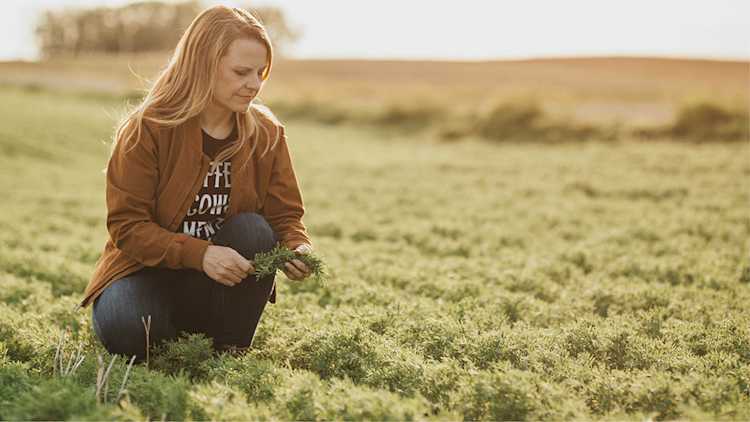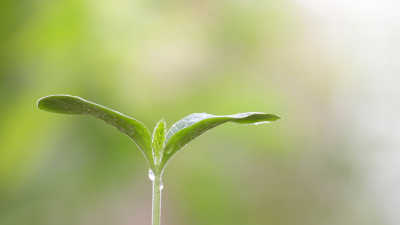The road to wellness: Lesley Kelly's journey

Watrous, Sask. grain farmer Lesley Kelly knows resiliency in farming and life is underpinned by physical and mental wellness. The creator of High Heels and Canola Fields and co-founder of Do More Ag shares her experience.
Farming requires mental stamina and support
I never planned to be a mental health advocate. About 10 years ago, my husband Matt and I decided to return to my parents’ farm, which had lost substantial acres to flooding. I tried to be supportive of my parents, but I didn�’t know the signs of distress, the language to use or where to access help.
Then, during my second pregnancy, I felt very anxious. The baby was fine but I struggled. I shut down and wasn’t talking about it, eating or showering. I wasn’t sleeping well and I began isolating myself. Matt helped me through postpartum depression, but he was also experiencing debilitating anxiety while farming.
One day, Matt had a panic attack. I thought, “Heart attack!” It was traumatizing and pivotal. We knew we had to do things differently for our family and the farm by incorporating mental wellness and understanding mental health within our marriage, extended family and farm.
Personal journey kickstarts conversations
In the summer of 2017, during a live video that we streamed on social media while sitting at our kitchen table, Matt and I talked about my postpartum experience and his anxiety. We wondered: Could our operating credit line or insurance be impacted if we were deemed higher risk? Could our landlords end land leases we had?
Will we lose friends? While we worried that speaking publicly could jeopardize our livelihood, we believed the cost of farming shouldn’t be our lives.
We wanted others to know they aren’t alone; there’s hope. That was the start of unveiling the idea that mental health conversations can happen in the kitchen, the field or the boardroom.
Building a strong farm culture
After we shared, we heard from so many people going through similar things. It really opened my eyes to the struggles that can be behind the scenes in agriculture and was the catalyst for understanding the landscape around mental health – from the stigma and need for help to the lack of awareness, resources and access to support.
Success on the farm isn’t about the acres, balance sheet or equipment – it’s about how we care for ourselves and each other.
Today, along with my brother and my mom, we farm about 7,000 acres, but my dad, who passed away in 2021, always said success on the farm isn’t the acres, balance sheet or equipment – it’s about how we care for ourselves and each other.
If we’re healthy, there’s a greater chance that the farm is healthy. When my dad had cancer, he lived with anxiety and depression. My husband hid his anxiety from his family for a long time. My brother has post-traumatic stress disorder (PTSD) and anxiety. Learning how to talk about it and building a culture on the farm and within the family around mental health and togetherness as a team helped.
We’ve learned that we’re never too busy to check in. It started with a check-in measurement each day on a scale of one to 10, with 10 being high stress or bad. Some days, Matt said he was 12. This led to discussing why and how the number was trending and how we could help.
Sometimes, just sharing how I feel moves me from a nine to a seven.
Speak up
We knew putting ourselves out there would prompt comments. Most were positive, but we were also told, “If you can’t handle the stress of farming, get out,” and, “You can’t call yourself a farmer.” Those hurt, especially from peers. People wouldn’t say that to someone who’d lost 20% of their acres to flooding. I cried sometimes but focused on the farmer who shared, “You just saved my life. I’m going to go home and talk to my wife.”
Surround yourself with personal and professional support
Dad drilled into us, “You can’t farm alone. You and your brother need each other. You’re stronger as a team.” We’ve focused on that with family and our support team – our marketer, agronomist and lender. We’re part of a peer group that helps us be accountable and whom we can lean on.
I’ve never phoned our lawyer and accountant so many times as in the past couple of years. We lost Dad’s knowledge and expertise, so we need others’ experiences and perspectives more than ever. Losing Dad and Matt’s mom, we’ve leaned on our team in business and in the “heart” stuff.
Change is progressive
Seeing as there wasn’t much for rural mental health or mental health and agriculture, I co-created Do More Ag to bring awareness, attention and resources to farmers. Agriculture is making inroads, access to services is growing and awareness is growing. Still, we need to keep planting those seeds, relating to and encouraging people through differences and similarities, and sharing stories.
Sometimes, it takes just one person you can relate to. I hope individuals struggling know there are healthy coping strategies and tools. I also do this selfishly for our sons, 12 and nine. They know more than I knew in my first 40 years. They recognize things, “Mom, sounds like you’re having a hard day. Do you want to talk?” If they want to return to the farm, they know there’s a community around them to help them, which helps me sleep better at night.
The National Farmer Crisis Line offers free, immediate, and ag‑informed support for farmers, farm families, and agricultural workers across Canada. It’s 24/7, confidential help when you need it most. Call 1‑866‑327‑6701.
Join the conversation!
To talk, listen or support, visit:
From an AgriSuccess article by Myrna Stark Leader.
